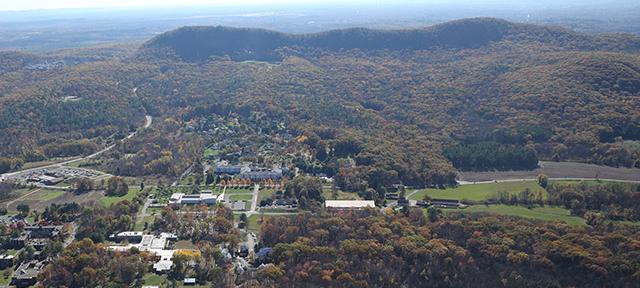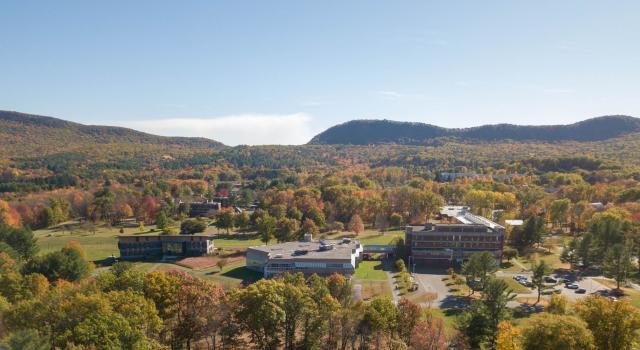Students Urged to Vaccinate for Meningococcal Disease Serogroup B

On Tuesday, November 28, Hampshire College and UMass issued a recommendation that all UMass undergraduate students and any Five College students who take classes at UMass Amherst get vaccinated for Serogroup B Meningococcal Disease to help prevent further cases.
VITAL INFORMATION FROM HAMPSHIRE HEALTH SERVICES
What has happened?
Two undergraduate UMass Amherst students have developed Serogroup B Meningococcal disease as of November 28, 2017. This is a life-threatening infection that can result in meningitis — swelling of the covering of the brain and spinal cord — and bloodstream infection. Because the disease can be so serious, UMass Health Services has given antibiotics to people who had close contact with the two sick students. These antibiotics will temporarily prevent those close contacts from also getting sick. Vaccinations for Serogroup B Meningococcal disease have also been administered to any UMass or Five College students who want the vaccine at their health centers. There have been no cases of meningococcal disease on any campus other than UMass.
A national Centers for Disease Control and Prevention laboratory has determined that the strains of meningococcal bacteria that caused both students’ infections are closely related. This means that there may be an increased risk of meningococcal disease for other undergraduates on the UMass campus, including Five College students who take classes on the UMass campus.
Who should get vaccinated?
Hampshire Health Services strongly recommends that the following Hampshire students get Serogroup B Meningococcal vaccinations:
- All Hampshire students who take classes at UMass.
- All students with conditions such as asplenia (not having a spleen), a complement deficiency, sickle cell anemia, or those taking the medication Solaris.
- Any Hampshire student who spends a substantial amount of time at UMass and would like to be vaccinated.
How do I get the Meningitis B vaccine?
Hampshire Health Services will be vaccinating students for Meningitis B by appointment on Wednesday, November 29 through Friday, December 1. Call 413.559.5458 to schedule a time as soon as possible:
Wednesday, November 29
10am to noon and 1pm to 4pm
Thursday, November 30
9am to 11am and 2pm to 4pm
Friday, December 1
9am to noon and 1pm to 4pm
Please be patient, as we have limited office staff and want to serve students as quickly as possible.
Will insurance cover the cost of the vaccination?
Yes. Hampshire’s student insurance through Blue Cross Blue Shield, and many other private insurances that don’t usually pay for the vaccine, will cover the full cost of the Meningitis B vaccine. Bring your insurance card to the clinic. For students without Hampshire Student Insurance, UMass will process the billing on your behalf so all students who need the vaccine can be protected as soon as possible.
If you don’t have Hampshire Student Insurance and are concerned about your private insurance not paying for the vaccine:
- Check with your insurance provider regarding their coverage of the vaccine.
- When speaking with your insurance representative, mention that the UMass campus has been designated an “outbreak” status by federal and state public health officials.
- Some insurance companies will require that your primary care provider (PCP) obtain a pre-authorization number. Contact your PCP at home before coming to the clinic.
- Be sure to check your pharmacy benefit as the vaccine may be covered through a written prescription, which Hampshire Health Services can provide.
- Some insurance plans may offer “in-network” coverage for the Meningitis B vaccine at a retail clinic such as CVS Minute Clinic. There is a CVS clinic in Amherst on University Drive.
IMPORTANT FACTS
What is meningococcal disease?
Meningococcal disease is a severe bacterial infection that typically occurs as meningitis (brain infection) and/or septicemia (bloodstream infection).
What causes meningococcal disease?
The bacteria Neisseria meningitidis are the cause of meningococcal disease. Four Neisseria meningitidis serogroups (C, W, Y and B) cause most cases of meningococcal disease in the United States. Because most current college students have been vaccinated against types C, W and Y, serogroup B has been the cause of all meningococcal disease outbreaks on college campuses in the last few years.
What are the symptoms?
Meningococcal disease can progress rapidly. You could feel fine one day and be in the hospital the next. Early symptoms are difficult to distinguish from other more common infections like influenza (“the flu”). Symptoms include fever, neck pain, rash, and headache. Most people exposed to the bacteria only carry it in their throats for a short period of time and do not become ill. If illness occurs, it typically happens within a few days of exposure to the bacteria. The disease is unpredictable, and no one really knows all the reasons why some carriers become sick while others do not and why some people have more severe disease than others. Seek medical attention immediately if you develop symptoms of meningococcal disease.
How is meningococcal disease spread?
Neisseria meningitidis, the bacteria that cause meningococcal disease, generally spread through direct exchange of respiratory and throat aerosols and secretions by close personal contact. The bacteria are more easily spread in crowded settings such as parties and bars, etc. Sharing smoking articles can directly spread the bacteria. Drinking by shared cups, funnels, or other drinking games using shared utensils that contact the mouth also can spread the bacteria. Smoking cigarettes/e-cigarettes/marijuana/hookahs damages the lining of the throat and increases the risk of developing meningococcal disease.
How can I prevent against the spread of meningococcal disease?
- Don’t share: cups, utensils, lipstick, cigarettes/e-cigarettes – anything containing saliva.
- Get vaccinated against meningococcal disease type B if you take classes or spend a lot of time at UMass Amherst.
- Don’t smoke.
- When you cough, cough into a sleeve or tissue.
- Wash or sanitize your hands often.
I received a meningococcal (‘meningitis’) vaccine when I was in high school. Doesn’t that protect me?
Meningococcal B (MenB) vaccines are fairly new — approved by the FDA in 2014 and 2015 — so most college students have not received it previously. However, all college students have been required to receive a vaccine that protects against four other serogroups of meningococcal disease (A, C, W, Y). That vaccine does not protect against serogroup B, which is the cause of current infections at UMass. Consequently, it is important for students considered at risk, as described above, to be vaccinated now with a MenB vaccine.
What should I do if I have had close contact with a person who has meningococcal disease?
If you had close contact with a person who has been diagnosed with meningococcal disease, you should come to Hampshire Health Services to get antibiotics to protect you from also getting sick. Close contact includes activities such as kissing, sneezing, or coughing on someone; sharing water bottles, lipsticks, or mouthpieces on musical instruments; sharing eating or drinking utensils; or sharing cigarettes or e-cigarettes with someone who got sick.
Students in contact with the two known cases at UMass were already treated by with antibiotics. There have been no cases at any other college, including no cases at Hampshire College.
Should UMass or Hampshire faculty and staff get vaccinated?
UMass recommends that only faculty or staff with conditions such as asplenia, a complement deficiency, those who take the medication Solaris, or have sickle cell anemia, who are at greater risk of becoming infected if exposed, get vaccinated. The CDC recommends people with these conditions get both types of meningitis vaccines regardless of an outbreak. We recommend that any faculty or staff who wish to get vaccinated contact your health care provider.
Is it safe for UMass students to go home to visit family or travel off campus? What about UMass students who take classes at Hampshire?
Health officials do not recommend any travel restrictions for members of the University community.
Are there any places on the UMass campus I should avoid? What about taking the PVTA buses?
No. The bacteria that cause meningococcal disease do not live on environmental surfaces or in the air. The bacteria can live outside the body for only a few minutes.
For more information about the Meningitis B vaccine
For more information about the disease:
http://www.mass.gov/eohhs/docs/dph/cdc/factsheets/m-o/meningococcal-college-students.pdf
https://www.cdc.gov/meningococcal/downloads/17-275138D-MeningococcalDis-B-Outbreak-FS.pdf



